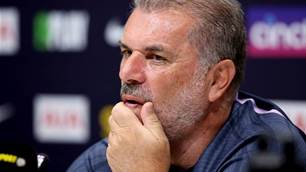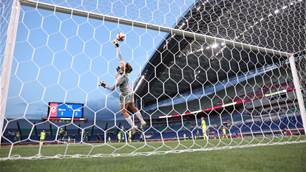IN 2004, Leeds were relegated from the Premier League after borrowing, spending and not performing. Now, Liverpool could face the same fate…
Broughton, the chairman, used the unveiling of the new manager not to promise unbridled success, but to make optimistic noises that the club could be dug out of its financial hole; a buyer found to dispatch Hicks and Gillett and build the club a future.
"There have been no offers at this stage," Broughton said of the sale process he was overseeing. "But we're hopeful a deal can be done by the end of the transfer window."
Hodgson's delighted statement - "I'm honoured to be taking on Britain's most successful football club" - still just about holds true, but it is based on glories receding further into the past. Manchester United drew equal in 2009 to Liverpool's record of 18 League Championship wins, and were just a point plus goal difference short of surpassing it last season. Much more significant than that is last season's landmark, which made it fully 20 years since Liverpool last won the championship, a startling gap after the club's routine dominance of the 1970s and 1980s.
If those decades of the boot room managerial conveyor belt, of Keegan and Toshack, Dalglish and Rush, Hansen and Lawrenson, terraces and tragedy, belonged monopolistically to Liverpool, the Premier League era, in which money became so determining a factor, was claimed from the start by United. Liverpool grew terrified about falling behind their rivals financially and on the field in the early 1990s as United began to seriously ring in the cash, and slapped extra tiers on Old Trafford until it reached its current, booming 76,000 capacity.
Liverpool's former chairman, David Moores, invested £12m ($20m) in 1991 to help to fund the all-seating of Anfield, as deemed required at all top clubs' grounds by the Taylor Report following the 1989 Hillsborough Disaster. Redvelopment of the Kop and Centenary Stand settled Anfield into its current 45,000 capacity, but through the 1990s Moores and chief executive Rick Parry gradually realised many more tickets would need to be sold to prevent Liverpool's financial eclipse by United.
Yet since the first plans were made more than a decade ago, for a new 60,000- or 70,000- seat stadium to be built on Stanley Park, nothing has happened. Liverpool remain stuck at Anfield - a true home the fans love, but whose leaving they have pragmatically accepted - increasingly short of the money required for top players, while United expanded, Roman Abramovich sunk £800m ($1.3bn) into Chelsea and Arsenal built the Emirates.
Tottenham finding their feet last season and the genuine billionaire takeovers at Manchester City and Aston Villa have cast Liverpool further behind, and the debts, losses and failure to qualify for the Champions League all threatened to make permanent that inferior status. That is why, in modern terms, the summer of 2010 was a Shankly, not a Paisley moment, and why Broughton's task was to find not just an investor, but a saviour.
Hicks and Gillett were the buyers supposed to make it all right again, buying the club in February 2007 when a deal had almost been done with Dubai International Capital - which may not, given Dubai's epic collapse since, have turned out any better. When the American pair strode onto the Anfield turf for their first public appearance after the takeover, they had clearly been briefed about what their new audience would most like them to say. They described Liverpool as a club of "outstanding historical wealth" - a strange choice of phrase - and said they would "do everything in [their] power" to uphold its "cherished traditions". They peppered their press conference with reverential mentions of the Kop. Seeking to reassure supporters they had not bought one of world football's greatest clubs simply to turn a buck, the two men installed their sons as directors and said they foresaw being involved for years, making "a multi-generational family commitment."
Amid all that PR were two specific pledges, whose breaking has stoked the outrage of Liverpool supporters more than any other letdown. They would, Hicks and Gillett promised, not "do a Glazers", a reference to the takeover at Old Trafford by the Florida family who loaded their own £559m ($934m) borrowings to do the deal onto the club itself to pay off. Hicks also said that within 60 days the spades would go in at Stanley Park.
"Everybody connected with the club, ex-players and supporters, believed we had what we wanted," laments Phil Thompson, the former Liverpool great who lived his own dream, from fan on the Kop to captain raising the European Cup, to assistant manager under Gerrard Houllier, and caretaker manager himself when Houllier fell ill. "We were led to believe that George Gillett had a lot of money, that Tom Hicks had billions, and now we were going to compete with Abramovich. But their promises, including that they would not put debt on the football club, were not kept, and this we have found extremely hard to bear."
Immediately after they announced their deal, it became clear that Hicks and Gillett had borrowed the money - £174m ($290m) plus professional fees, making £185m ($309m) in total - from the Royal Bank of Scotland. At the time, Liverpool's own net debt, restrained with almost paranoid caution by Parry and Moores, was £44.8m ($74.8m). But the club was struggling to keep its place in the vital, Champions League-qualifying top four, and the documents revealed that Moores had personally lent the club £10m ($16.7m) in August 2006, which Benitez spent buying Dirk Kuyt from Feyenoord.
Moores had that money repaid and famously now, but somewhat overlooked in all the optimism back then, Hicks and Gillett paid him £89.6m ($149.7m) personally for his shares. Moores broke his silence in May when he wrote a long letter to The Times saying he felt betrayed by Hicks and Gillett, but he did not offer to put a chunk of that £89.6m ($149.7m) towards finding a solution.
It did not take long after the takeover for the revelation that Hicks and Gillett did in fact "do a Glazer" after all. They have made Liverpool itself responsible for paying off the debts and the interest which they themselves took on to buy the club in the first place. They were not billionaires bringing sentiment and cash to Liverpool, but investors bearing debt.
Continued on next page...
Related Articles

Postecoglou looking to A-League to 'develop young talent'
.jpeg&h=172&w=306&c=1&s=1)
Big change set to give Socceroos star new lease on life in the EPL












